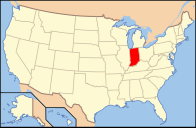Indiana Governor signs needle exchange program
Friday, May 8, 2015

Image: United States Congress.
Indiana Governor Mike Pence dropped his former opposition to needle exchange programs and on Tuesday signed legislation passed by lawmakers on April 29 — the last day of the state's legislative session — that would allow local health departments, municipalities, counties, or nonprofit organizations to implement needle exchange programs. The debate about the controversial programs came on the heels of an HIV outbreak in Southern Indiana.
Austin, in Scott County, Indiana, was the epicenter of the outbreak. The number of new HIV positive cases in Scott County in this outbreak rose past 140. Governor Pence declared the outbreak a public health emergency on March 26, and at the same time approved a 30-day needle exchange program. Pence since offered a 30-day extension as the number of HIV positive cases continued to rise.
Needle exchange programs provide clean needles in exchange for dirty needles. The sharing of dirty needles has been linked to the outbreak. Experts like Chris Beyrer, president of the International AIDS Society, support needle exchange programs. Beyrer told the Indianapolis Star, however, that temporary measures, like the one Pence implemented on March 26, don't solve the long-term problem. The World Health Organization and the Centers for Disease Control and Prevention also recommend needle exchange programs. But experts say long-term needle exchange programs are needed.
The HIV epidemic in Southern Indiana has been linked to a drug problem in Scott County. HIV and Hepatitis C are blood-borne viruses that spread by way of bodily fluids and bloodstream injections, especially when more than one person is using the same needle.
Legislators on the committee responsible for Senate Bill 461 heard testimony last week before voting. Representative Thomas Washburne, Republican, Evansville, told Wikinews on April 27 that he was involved in conversations pertaining to needle exchange programs. "I am inclined to follow the recommendations of the Centers for Disease Control in implementing needle exchanges," Washburne said in an interview with Wikinews. "My vote against Senate Bill 461 was not due to the needle exchanges, but other issues involved in the bill."
House members passed the bill 80–19, senators 38–11.
After legislators passed the bill, Pence told WISH-TV: "From my perspective, the focus needs to be on health emergencies. I have throughout my career not supported needle exchanges as anti-drug policies. But with regard to addressing an epidemic, which is what we’ve seen in Scott County, which is unprecedented in any rural part of the country. I was prepared to support that through executive action."
Louisville, Kentucky, about 35 miles south of Austin, was the first Kentucky municipal government to approve a needle exchange program. The Louisvile Metro Council voted 22–0 to approve the program on April 23. That approval requires reconsulting the council before actually implementing such a program. About 195 cities in the United States have adopted similar programs.
Dr. William Shaffner, a doctor and chair of the Department of Preventative Medicine at Vanderbilt University in Nashville, Tennessee, told Wikinews reporters March 25 at the University of Southern Indiana in Evansville, the day before Pence declared the public health emergency, such a program would make sense. He said the best course of action would be to "block and tackle."
"Needle exchange programs ought to be used," Shaffner said. "They have been proven to work and do not cause an increase in drug use."

Dr. William Schaffner presents March 25, 2015 at the 2015 Shaw Lecture at the University of Southern Indiana about emerging infectious diseases.
Image: Gkstylianides.

USI Biology Professor Marlene Shaw welcomes a full house to the 2015 Shaw Lecture on March 25, 2015 at the University of Southern Indiana.
Image: Gkstylianides.

A crowd of students, faculty and healthcare professionals gather during the 2015 Shaw Lecture on March 25, 2015 in Mitchell Auditorium at the University of Southern Indiana to hear Dr. William Shaffner present.
Image: Gkstylianides.

Dr. William Shaffner answers questions from students on March 25, 2015 during the 2015 Shaw Lecture at the University of Southern Indiana.
Image: Gkstylianides.
Sources
- Lesley Weidenbener (TheStatehouseFile.com). "Pence signs law to facilitate needle exchange programs" — The Indianapolis Star, May 5, 2015
- Tom Davies (AP). "Pence Signs Needle-Exchange Bill as HIV Outbreak Cases Grow" — ABC News, May 5, 2015
- Bennett Haeberle. "Gov. Pence says he will ‘support’ needle exchange bill" — WISH-TV, May 4, 2015
- "Faced with HIV outbreak, Indiana lawmakers OK needle exchange programs" — Chicago Tribune, April 30, 2015
- Shari Rudavsky. "Needle exchange can help stop HIV spread, experts say" — The Indianapolis Star, April 27, 2015
- AP. "Deadline nears for Indiana needle-exchange bill" — South Bend Tribune, April 24, 2015
- Phillip M. Bailey. "Metro Council approves needle exchange" — Louisville Courier-Journal, April 23, 2015
- "Indiana General Assembly 2015 Session Committees" — Indiana General Assembly, May 7, 2015 (date of access)
- Senator Patricia Miller, Senator Vaneta Becker. "Indiana General Assembly 2015 Session Senate Bill 461" — Indiana General Assembly, May 7, 2015 (date of access)

